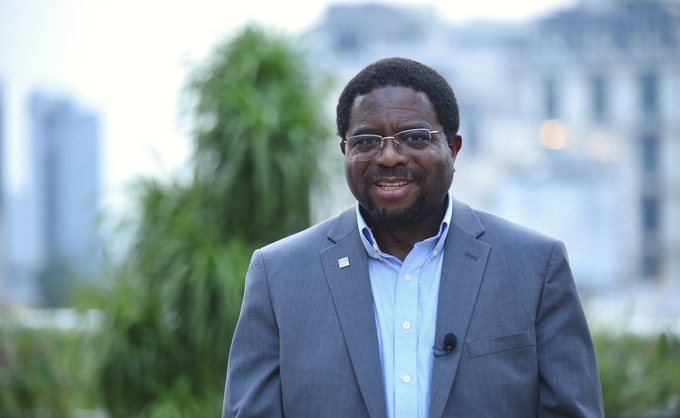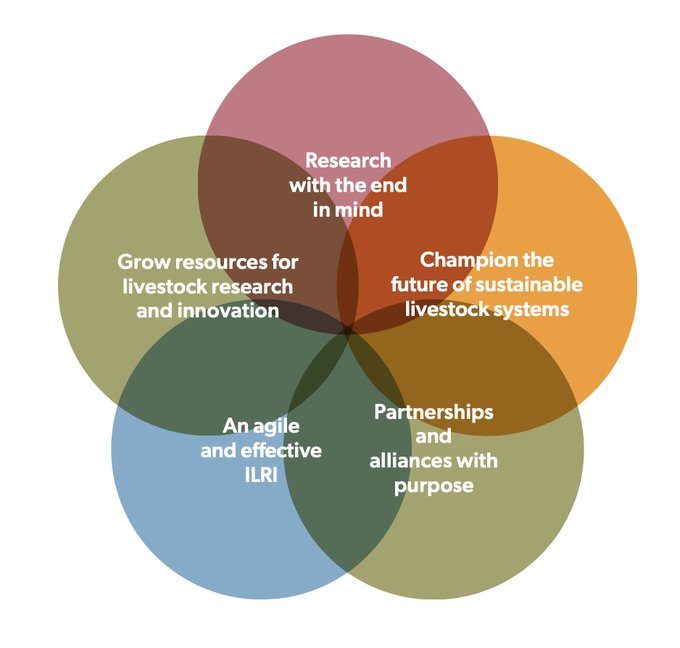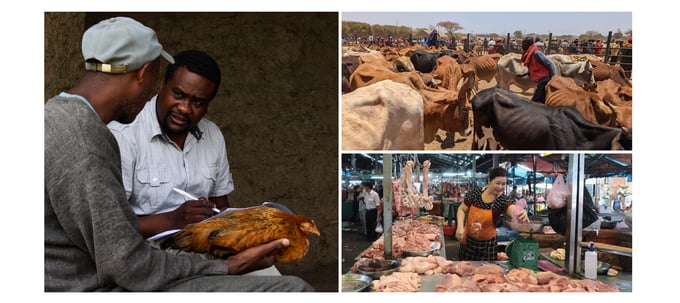May 17, 2025 | 02:47 GMT +7
May 17, 2025 | 02:47 GMT +7
Hotline: 0913.378.918
May 17, 2025 | 02:47 GMT +7
Hotline: 0913.378.918

Prof. Appolinaire Djikeng (left) and H.E. Deputy Minister of Agriculture and Rural Development, Phung Duc Tien (right) co-chaired ILRI@50 celebration. Photo: Tung Dinh.
From October 14 to 18, in Hanoi and Quang Ninh, Vietnam, the International Livestock Research Institute (ILRI) celebrated its 50th anniversary and unveiled a new Strategy for Sustainable Livestock Development.
Since 1999, ILRI has collaborated closely with Vietnam’s livestock sector, implementing key research initiatives spanning food safety, animal health, climate change, and sustainable livestock production. In 2006, ILRI established an official office in Vietnam, focusing on areas such as food safety, animal health, One Health approaches, and enhancing livestock productivity.
Vietnam Agriculture Newspaper proudly presents an interview with Professor Appolinaire Djikeng, Director General of ILRI and Managing Director of CGIAR’s Resilient AgriFood Systems.
- Why did ILRI choose Vietnam as the host country for its 50th anniversary celebrations?
Prof. Appolinaire Djikeng: Let me answer this from two perspectives.
First, the strategic importance of ILRI’s partnership with Vietnam. Choosing Vietnam to co-host ILRI’s 50th anniversary highlights our longstanding collaboration and underscores the country’s role in advancing livestock production in the region. Vietnam has been an active partner in improving livestock productivity and health, contributing significantly to food security and the livelihoods of millions.
Second, this choice reflects ILRI’s commitment to the Government of Vietnam. Hosting this milestone event in Vietnam reinforces our dedication to supporting countries that lead the way in sustainable livestock management and innovative, evidence-based practices.
For us, the 50th anniversary is not only an opportunity to celebrate shared achievements but also to reaffirm our long-term commitment to fostering the growth of Vietnam’s livestock sector.

Professor Appolinaire Djikeng, Director General of ILRI and Managing Director of CGIAR’s Resilient AgriFood Systems. Photo: Thanh Thuy.
- A notable aspect is that ILRI's new strategic phase aligns perfectly with Vietnam’s Livestock Development Strategy to 2030. What are your thoughts on this?
Prof. Appolinaire Djikeng: This alignment is not a coincidence. It is the result of deliberately designing our strategy to meet the real needs of our partners.
Over nearly two decades of working in Vietnam, our primary goal has been to deeply understand the country’s needs. In developing our strategy, we initiated a consultation process at both the national and regional levels, including direct engagement with Vietnamese technical agencies.
Interestingly, you’ll notice parallels between our action plans for Vietnam and other regions, such as Kenya or Ethiopia in Africa. This is because our strategy is tailored to the unique requirements of the countries and regions we serve while addressing shared global challenges.
The year 2030 represents a pivotal milestone as the United Nations assesses global progress on the Sustainable Development Goals (SDGs), particularly in eradicating poverty and advancing sustainability. While significant strides have been made in some areas, others require more focused efforts.
By 2030, it will be crucial to take stock of our achievements, identify weaknesses, and continue refining our approaches. ILRI’s work emphasizes five core impact areas, helping us track and measure progress toward the SDGs.

- ILRI’s 2024–2030 strategy sets an ambitious goal to positively impact the lives of 300 million people. Could you share your vision for creating a fair and equitable livestock system as this new strategy unfolds?
Prof. Appolinaire Djikeng: Our projects are implemented in many countries across Asia, Africa, and Latin America. For instance, Vietnam’s population exceeds 100 million people, Nigeria has nearly 200 million, and Ethiopia over 120 million. In many of these countries, a significant proportion of the population relies on livestock as their primary source of income. These are the communities where we aim to measure our impact and work toward our target of 300 million people.
This goal is ambitious yet achievable, but we recognize that reaching it is not solely ILRI’s responsibility. As a global research organization, we cannot scale innovative solutions alone. Strategic partnerships are critical – involving communities, international organizations, and the private sector – to take these innovations to a broader audience.
Let me share an example. If we identify heat-tolerant cattle breeds as suitable genetic resources for specific regions, farmers will be more willing to invest in them, knowing they offer resilience and long-term benefits. Access to such improved genetic resources or breeding stock significantly reduces risks, such as livestock losses due to extreme heat or drought. These solutions are not only impactful but also commercially viable.

ILRI focuses on enhancing livestock productivity in its partner countries. Photo: ILRI.
Starting in 2025, ILRI programs will incorporate a robust scaling component. This scientific approach leverages decades of accumulated knowledge and experiences from Africa, Asia, the Americas, and beyond. By synthesizing global data and insights, we aim to accelerate the scaling-up process of successful models and innovations.
This area, however, requires significant investment, not just financial but also in building collaborative alliances. Interdisciplinary partnerships are essential to ensure sustainable development.
- What are your thoughts on the challenges facing low- and middle-income countries in Asia and Africa as they work to expand livestock production while minimizing their environmental impact?
Prof. Appolinaire Djikeng: One of the most pressing challenges for low- and middle-income countries in livestock development is low productivity. To address this, ILRI focuses on enhancing livestock productivity in its partner countries.
However, our efforts go beyond simply boosting productivity. We aim to offer sustainable agricultural solutions that address both economic and environmental concerns.
The core issue is achieving a balance between growth and sustainability. It’s no secret that livestock production impacts the environment. The central question for ILRI researchers is: How can we close the productivity gap between regions while maintaining environmental health?
A key focus of our work is reducing greenhouse gas emissions across livestock production systems, regardless of their scale. ILRI’s primary goal is to equip farmers with scientific, evidence-based solutions, whether through improved breeds, better nutrition, or more efficient management practices.
ILRI is committed not only to enhancing economic efficiency for farmers but also to ensuring that the entire system is sustainable. This means providing comprehensive, scalable solutions that benefit farmers, communities, and the environment.
Translated by Quynh Chi

(VAN) Cold-barn systems efficiently manage environmental and temperature conditions, which aids in the prevention of respiratory diseases in pigs and protects them from the vectors that transmit African swine fevers.

(VAN) To tackle challenges, the project 'Addressing key technical bottlenecks in the grouper supply chain in Vietnam' has been underway since 2024.

(VAN) The project 'Disease-Resilient and Sustainable Cassava Production Systems in the Mekong Region', funded by the Australian Center for International Agricultural Research (ACIAR), is being implemented from 2024 to 2028.

(VAN) Data from 10,000 farming households will help professionalize production organization and support the implementation of the One Million Hectares Program for High-Quality, Low-Emission Rice Cultivation.

(VAN) FAO Director-General QU Dongyu marks International Day of Plant Health at NENA conference.

(VAN) Deputy Minister of Agriculture and Environment Hoang Trung affirmed that floriculture and ornamental plants are a growing industry that receives significant global attention.

(VAN) The three staple crops dominating modern diets – corn, rice and wheat – are familiar to Americans. However, fourth place is held by a dark horse: cassava.